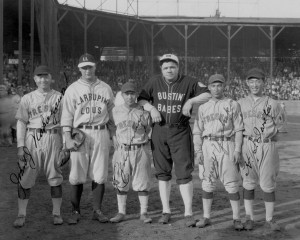
How baseball helped Japanese Americans develop an identity and bond with America will be addressed in the Selig Distinguished Lecture in Sport and Society on Tuesday, Jan. 24, at the University of Wisconsin-Madison.
Samuel O. Regalado, history professor at California State University, Stanislaus, will present "One Base at a Time: Baseball and the Nikkei People" at 4 p.m. in the Pyle Center, 702 Langdon St.
"One Base at a Time" is about baseball's relationship to members of the Japanese American community and how the game helped shape their identity. Their transition from being social outcasts at the outset of the 1900s in America to a position of respect nearly a century later was a step-by-step process or, to put it another way, a journey taken "one base at a time." And the national pastime had a hand in the task.
Participation in the game linked generations. It also was a mechanism for ethnic solidarity and support, and an athletic activity through which they could reasonably compete with mostly larger Caucasians. Promoters of baseball saw it as an example of patriotic values. The Japanese American press featured and marketed the national pastime with zeal.
Even incarceration during World War II did not deter the passion Japanese Americans held for the game, and they continued to celebrate and play baseball not behind ivy-covered fences, but those made of barbed wire. By the mid- to late '90s, thanks to the emergence of such major league players as Lenn Sakata, Don Wakamatsu and Kurt Suzuki, the visibility of the Nikkei baseball tradition increased.
The story uncovers a unique and rewarding feature of the American past and profiles a people who stood by the national pastime even during their darkest moments.
Regalado is a native of the Los Angeles area, and he joined the California State University, Stanislaus faculty in 1987 after earning his Ph.D. from Washington State University. He earned his undergraduate degree from California State University, Northridge and his master's degree from Washington State University. His research areas include Latin American and East Asian history, and United States ethnic and immigration, sports and legal history.
His book "Viva Baseball!: Latin Major Leaguers and their Special Hunger" was a Casey Award "Book of the Year" finalist and a San Francisco Chronicle "Top Three Most Highly Recommended Books."
His essays include "Invisible Baseball: Japanese Americans and their Game in the 1930s," "Baseball Along the Columbia: The Nisei, their Community, and their sport in Northern Oregon" and "From the Heart: Rural and Urban Nisei Baseball: A Comparison."
He is a frequent guest historian and consultant on baseball-related public radio and television programs. Regalado was the recipient of the CSU, Stanislaus Outstanding Research, Scholarship, and Creative Activity Professor Award for 2010-11.
Allan H. "Bud" Selig ('56 BS L&S), the ninth commissioner of Major League Baseball, earned his UW-Madison degrees in history and political science and was, at one time, an aspiring history professor.
Selig is the former owner of the Milwaukee Brewers professional baseball team and is credited with bringing baseball back to Milwaukee in 1970. He became acting baseball commissioner in 1992 and officially assumed the post in 1998.
In 2010, he established the Allan H. Selig Chair in History at the UW-Madison. The distinguished Selig chair will support a new faculty position focusing on teaching and research related to the development of professional sports in their larger national and social contexts, including race, gender, labor relations, "mass culture," economic organization and how sports both influence and reflect broad social change.
Selig, whose term as commissioner was recently extended by the major league owners, has said he will return to UW-Madison after retirement to write his memoirs and to create a legacy in his chosen field of history. The Selig Chair and related programs like the Selig lecture will allow the UW-Madison to play a key pioneering role in the emerging scholarly field of American sports history.
Regalado's Selig Distinguished Lecture in Sport and Society is sponsored by the UW-Madison Department of History, Asian American Studies Program and Center for East Asian Studies.
